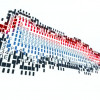AMD's "heterogeneous Uniform Memory Access" coming this year in Kaveri
AMD wants to talk about HSA, Heterogeneous Systems Architecture (HSA), its vision for the future of system architectures. To that end, it held a press conference last week to discuss what it's calling "heterogeneous Uniform Memory Access" (hUMA). The company outlined what it was doing, and why, both confirming and reaffirming the things it has been saying for the last couple of years.
The central HSA concept is that systems will have multiple different kinds of processor, connected together and operating as peers. The two main kinds of processor are conventional: versatile CPUs and the more specialized GPUs.
Modern GPUs have enormous parallel arithmetic power, especially floating point arithmetic, but are poorly-suited to single-threaded code with lots of branches. Modern CPUs are well-suited to single-threaded code with lots of branches, but less well suited massively parallel number crunching. Splitting workloads between a CPU and a GPU, using each for the workloads it's good at, has driven the development of general purpose GPU (GPGPU) software and development.










































































